A coughing cat might seem harmless at first, but it can be a red flag for serious health problems. Unlike humans, cats don’t cough often, so when they do, it usually means something is wrong. A simple hairball might be the cause, but persistent or frequent coughing could signal conditions like feline asthma, respiratory infections, or even heartworm disease.
Ignoring a coughing cat can lead to worsening symptoms and serious complications. Some causes, like infections or allergies, may be treatable at home with the right care, while others require urgent veterinary attention. Understanding the warning signs and knowing when to take action can make all the difference in protecting your cat’s health.
In this post, I’ll break down the top seven reasons your coughing cat might need urgent help and when you should see a vet. Let’s dive in!
Feline Asthma: A Common but Serious Condition
Symptoms to Watch For
Feline asthma causes more than just an occasional cough. If your cat struggles with frequent coughing fits, wheezing, or labored breathing, take these symptoms seriously. Cats with asthma often crouch low and stretch their necks forward while coughing, resembling a hacking motion. You may also notice open-mouth breathing, which is rare and concerning in cats. Lethargy is another warning sign—if your cat seems less playful or avoids activity, breathing difficulties could be draining its energy. Severe cases may lead to bluish gums due to a lack of oxygen, which requires immediate emergency care.
What Causes It?
Feline asthma happens when allergens or irritants inflame the airways, making it difficult for your cat to breathe. Dust, pollen, mold, cigarette smoke, and even scented candles can trigger an asthma attack. Stress and anxiety may also worsen symptoms, causing more frequent coughing episodes. Certain cats, especially those with genetic predispositions or weakened immune systems, are more likely to develop asthma. If your cat’s symptoms flare up seasonally or after exposure to household irritants, asthma is a likely culprit.
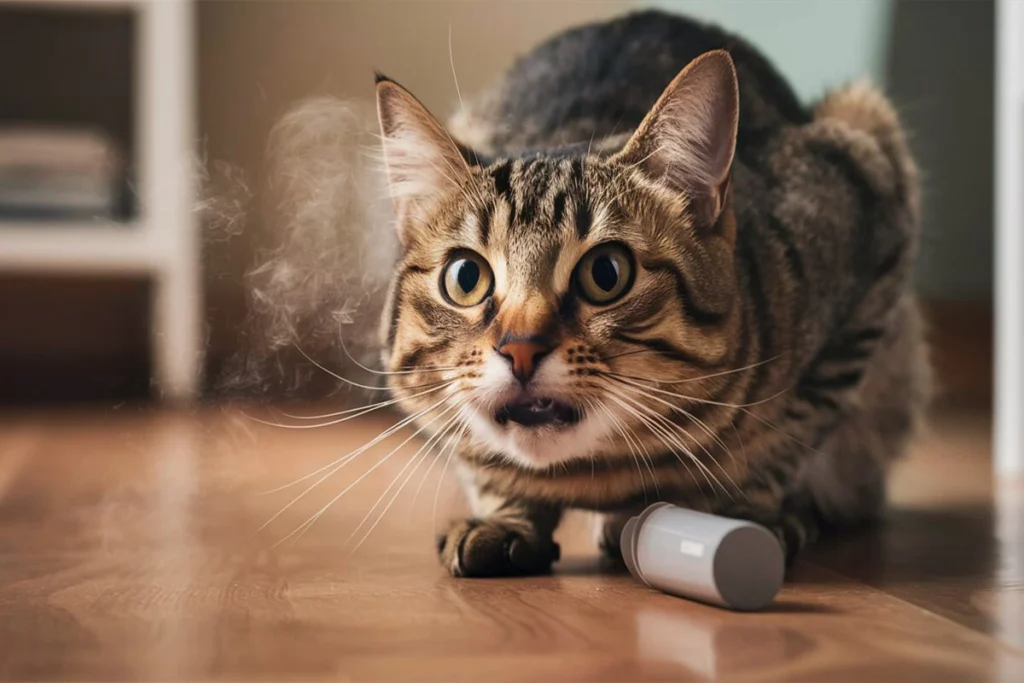
Treatment Options
Managing feline asthma requires a combination of medication and environmental adjustments. Veterinarians often prescribe corticosteroids to reduce airway inflammation, either in pill form or through inhalers designed specifically for cats. Inhaled medications work best because they target the lungs directly with fewer side effects. Some cats also benefit from bronchodilators, which help open the airways during an asthma attack. At home, using an air purifier, eliminating smoke exposure, and reducing dust buildup can prevent flare-ups. For severe cases, nebulizer treatments deliver medication directly to the lungs, helping cats breathe more easily.
Respiratory Infections: Bacterial and Viral Threats
Common Infections
Respiratory infections in cats can develop from bacterial, viral, or fungal pathogens. Upper respiratory infections (URIs) often spread through shelters, multi-cat households, or boarding facilities, making social cats more vulnerable. Feline herpesvirus (FHV) and feline calicivirus (FCV) cause most viral respiratory infections, leading to chronic or recurring symptoms in some cats. Bacterial infections, such as Bordetella or Chlamydia, can worsen a cat’s condition, turning mild coughing into persistent respiratory distress. In severe cases, an untreated infection can progress into pneumonia, which makes breathing extremely difficult. Kittens, senior cats, and those with weakened immune systems face the highest risk of complications.
Key Symptoms
A coughing cat with a respiratory infection often shows other symptoms besides just coughing. Sneezing, nasal discharge, and watery eyes indicate upper respiratory involvement, while fever, lethargy, and appetite loss suggest a more severe infection. Some cats develop wheezing or difficulty breathing, especially if the infection causes inflammation in the lungs. If your cat breathes with an open mouth or makes raspy, congested sounds, the infection may be progressing into pneumonia. Persistent coughing accompanied by extreme fatigue or refusal to eat requires urgent veterinary attention.
Treatment Plan
Veterinarians treat respiratory infections based on the underlying cause. Antibiotics help clear bacterial infections, while antiviral medications may ease symptoms of feline herpesvirus. Supportive care plays a crucial role in recovery—keeping your cat hydrated, encouraging food intake, and using a humidifier can help relieve congestion. If nasal discharge clogs your cat’s nose, gently wiping it away with a warm, damp cloth improves breathing. In severe cases, hospitalization may be necessary for oxygen therapy and intravenous fluids. Preventative care, including vaccinations for feline herpesvirus and calicivirus, reduces the risk of future infections and protects vulnerable cats from severe complications.
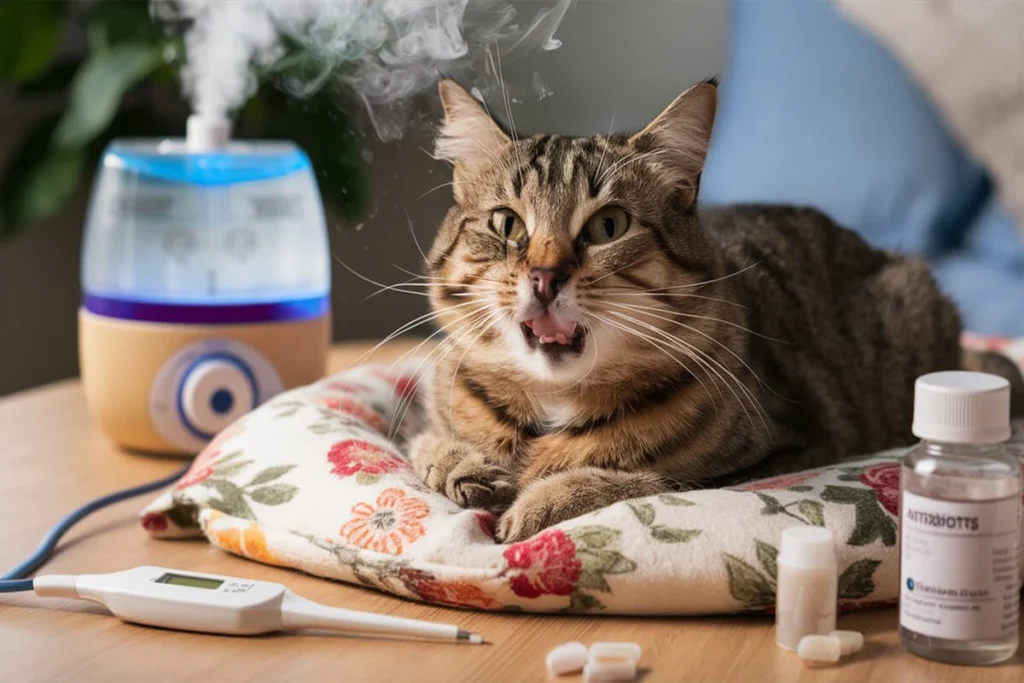
Heartworm Disease: A Hidden but Deadly Danger
Why It’s Concerning
Heartworm disease poses a serious threat to cats, even though many people assume it only affects dogs. Unlike in dogs, where heartworms grow and multiply, cats often develop severe inflammatory reactions from just a few worms or even immature larvae. These parasites travel through the bloodstream and settle in the lungs, causing a condition known as heartworm-associated respiratory disease (HARD). Since heartworms can’t be easily detected in cats and no approved treatment exists to eliminate them, prevention becomes the only effective approach. Left unchecked, heartworms can cause chronic respiratory problems, organ damage, or even sudden death due to an extreme immune response.
Symptoms
A cat with heartworm disease may develop a persistent cough, wheezing, and difficulty breathing, which often mimic asthma or bronchitis. Lethargy and reduced activity levels signal that your cat struggles to get enough oxygen. Some cats may show intermittent vomiting or appetite loss without any apparent stomach issues. In severe cases, heartworms can trigger sudden respiratory distress, leading to open-mouth breathing or fainting. Unfortunately, some cats show no warning signs before experiencing a fatal collapse, making early detection and prevention essential.
Diagnosis & Treatment
Veterinarians diagnose heartworm disease in cats through a combination of blood tests, X-rays, and ultrasound imaging. Since standard heartworm tests detect adult worms, which cats may not always develop, multiple tests may be necessary to confirm the infection. If a vet suspects heartworms, they focus on managing symptoms rather than eliminating the parasites. Corticosteroids help reduce lung inflammation, while bronchodilators and oxygen therapy assist cats struggling to breathe. In high-risk cases, veterinarians may attempt risky surgical removal of heartworms, though this remains a last resort. Because no safe heartworm treatment exists for cats, the best approach involves monthly preventive medications, which effectively stop the infection before it starts.
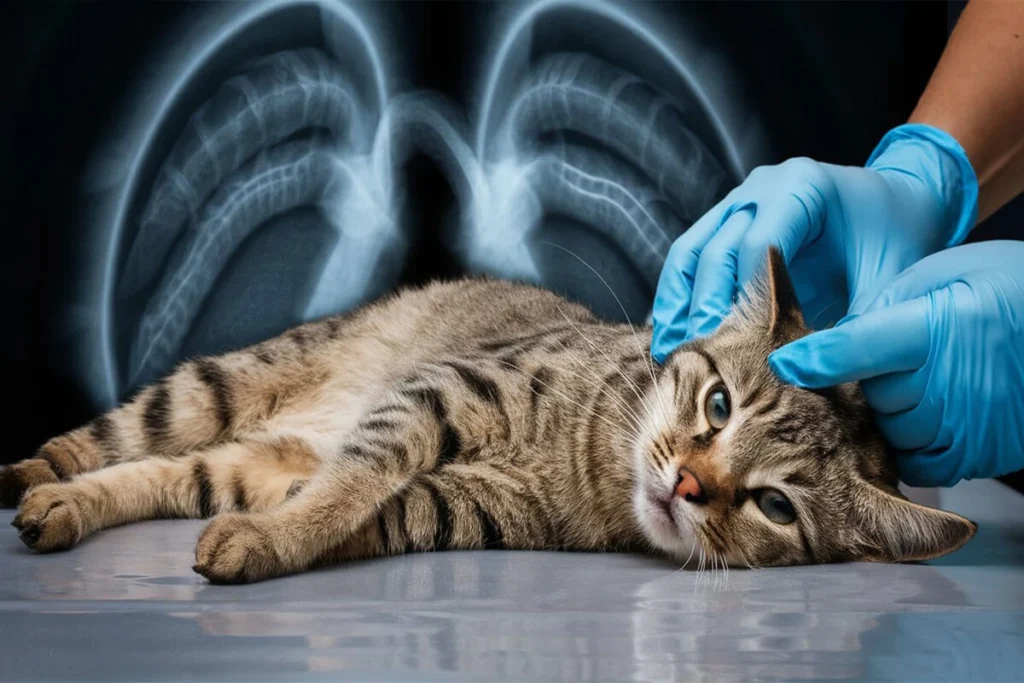
Allergies and Irritants: Common Triggers for Coughing
Environmental Causes?
A coughing cat can develop allergies or respiratory irritation from everyday environmental triggers. Dust, mold, pollen, and smoke often cause inflammation in a cat’s airways, leading to persistent coughing. Household products like air fresheners, scented candles, and cleaning chemicals release strong fumes that cats inhale, irritating their lungs. Even certain types of cat litter, especially those with strong fragrances or excessive dust, can trigger coughing episodes.
Outdoor allergens also contribute to respiratory issues. Seasonal pollen spikes, grass clippings, and car exhaust can affect sensitive cats, especially if they spend time near open windows or on patios. In multi-pet households, dander from other animals might worsen allergy-related coughing. Poor air circulation in the home increases exposure to airborne irritants, making symptoms last longer or become more severe. Identifying and removing these triggers can significantly improve a coughing cat’s breathing and overall health.
Symptoms of Allergic Reactions
Cats experiencing allergic reactions from environmental irritants often show more than just a cough. Sneezing, watery eyes, and nasal discharge indicate that allergens affect the upper respiratory system. Some cats develop itchy skin, excessive grooming, or hair loss due to allergic reactions that trigger both respiratory and dermatological issues. If a cat frequently scratches its face or rubs its nose against furniture, it may be reacting to airborne irritants.
Breathing difficulties can also develop when allergies become severe. A coughing cat with wheezing or labored breathing might struggle with airway inflammation. Open-mouth breathing or panting, though rare in cats, signals an urgent need for veterinary care. Lethargy and a sudden decrease in activity levels often indicate that breathing problems have drained the cat’s energy. Tracking these symptoms helps pinpoint whether allergens or other respiratory issues are causing the coughing.
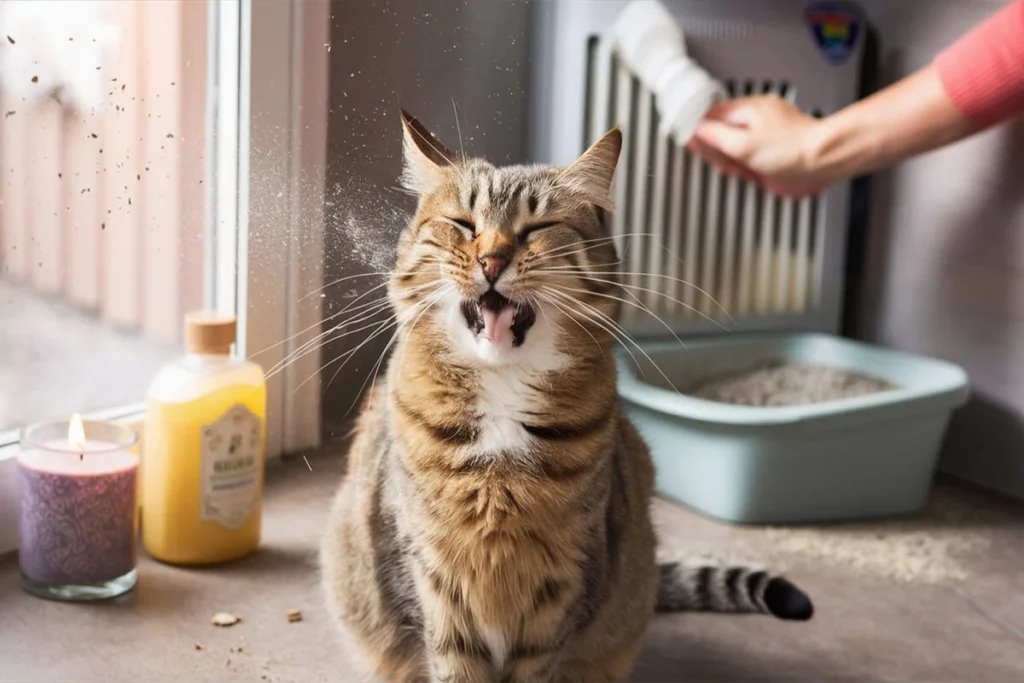
How to Help
Reducing exposure to allergens can make a huge difference in a coughing cat’s health. Start by switching to a low-dust, fragrance-free cat litter to prevent inhalation of irritating particles. Regularly clean and vacuum your home to remove dust, pet dander, and mold spores that contribute to respiratory inflammation. Using an air purifier with a HEPA filter removes airborne allergens, improving air quality for sensitive cats.
Avoid using strong-smelling cleaning products, air fresheners, or candles in areas where your cat spends time. If outdoor allergens seem to be a problem, keeping windows closed during high-pollen seasons and wiping your cat’s fur with a damp cloth after outdoor exposure can reduce irritation. If allergies persist, a veterinarian may recommend antihistamines or corticosteroids to control inflammation and ease coughing. Identifying and eliminating triggers, along with supportive veterinary care, gives a coughing cat the best chance to breathe easily and live comfortably.
Hairballs or Something More? When Gagging Looks Like Coughing
How to Tell the Difference
Many cat owners mistake coughing for gagging, but these two actions signal different issues. A coughing cat usually makes a deep, hacking sound, often in short bursts. The cough may seem dry or produce mucus, depending on the underlying cause. Some cats lower their heads and extend their necks forward when they cough, appearing as if they are trying to clear something from their throat. Coughing often happens due to respiratory problems, infections, or inflammation in the airways.
Gagging, on the other hand, sounds more like retching. A cat that gags may stick out its tongue, make swallowing motions, and produce saliva or foam. Gagging usually happens when a cat tries to expel something from its throat, such as a hairball, a piece of food, or even a small foreign object. If the cat successfully coughs up a hairball or something visible, the issue might not be serious. However, frequent gagging without producing anything may indicate an obstruction or irritation that requires veterinary attention. Watching your cat closely during these episodes helps determine whether the problem involves coughing or gagging.
Potential Underlying Issues
If your coughing cat isn’t dealing with a simple hairball, other health problems could be at play. Respiratory conditions, such as feline asthma or bronchitis, cause inflammation in the airways, leading to frequent coughing. Infections, including pneumonia or feline herpesvirus, can also trigger persistent coughing along with sneezing, nasal discharge, or fever. If a cat has trouble breathing along with coughing, lung infections or fluid buildup in the lungs could be the cause.
Heart disease is another hidden cause of coughing in cats. Conditions like congestive heart failure can lead to fluid accumulation in the lungs, making breathing difficult and causing a soft, chronic cough. In some cases, parasites such as lungworms or heartworms invade the respiratory system, leading to coughing and breathing distress. A veterinarian can determine the exact cause through exams, X-rays, and lab tests. Recognizing these potential health threats early allows for quicker treatment and better outcomes.
Prevention & Remedies
If hairballs cause your cat’s coughing, regular grooming can help prevent excessive shedding and reduce hairball formation. Brushing your cat frequently removes loose fur before it can be swallowed. Adding fiber to your cat’s diet, either through hairball control food or small amounts of canned pumpkin, helps move hair through the digestive system more efficiently. Over-the-counter hairball gels or laxatives can also help ease passage.
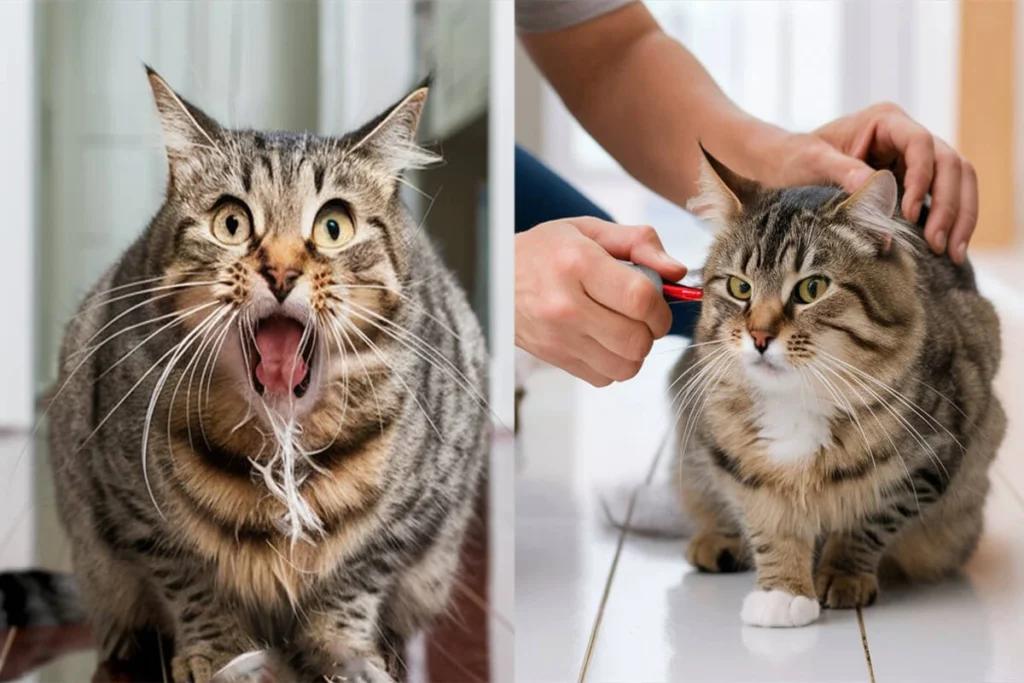
For cats with respiratory issues, keeping their environment free of dust, smoke, and strong chemical odors reduces airway irritation. Using a humidifier in dry climates can help prevent coughing caused by airway dryness. If your coughing cat suffers from allergies, switching to hypoallergenic litter and using an air purifier can minimize exposure to common irritants.
If your cat continues coughing without improvement, schedule a vet visit to rule out serious health conditions. A veterinarian may prescribe medications such as steroids, antibiotics, or bronchodilators, depending on the cause. When caught early, many respiratory and digestive issues can be managed effectively, ensuring your cat stays healthy and comfortable.
Conclusion
A coughing cat may seem like a minor issue, but it often signals a deeper health problem that requires attention. Occasional coughing might be harmless, especially if hairballs are the cause, but frequent or persistent coughing can point to serious conditions like feline asthma, respiratory infections, or even heartworm disease. Ignoring these symptoms can put your cat’s health at risk, leading to complications that become harder to treat over time.
Understanding the causes of your cat’s cough helps you take the right steps to protect its well-being. Environmental factors, including dust, smoke, and allergens, often trigger coughing and wheezing. Reducing these irritants, keeping your home clean, and using an air purifier can improve your cat’s respiratory health. If your cat struggles with chronic coughing, tracking symptoms and identifying triggers can help you and your vet determine the best course of action.
When your coughing cat shows warning signs like difficulty breathing, lethargy, or a lack of appetite, don’t wait—seek veterinary care immediately. A timely diagnosis can make all the difference, whether the issue involves an infection, allergies, or a more serious underlying condition. Preventative care, including regular vet checkups, vaccinations, and heartworm prevention, ensures that your cat stays healthy and avoids life-threatening complications.
Your cat depends on you to notice the signs and take action when something isn’t right. By staying informed and proactive, you can keep your furry companion happy, comfortable, and safe from respiratory illnesses. If your cat’s cough continues or worsens, consult a veterinarian to find the best treatment plan. A little caution and early intervention can go a long way in ensuring a long and healthy life for your pet.
Discover the Top 5 Reasons why your Cat Sneezing & what you should Do?
Read More About Cats Here!
Find Some Good stuff for your Cat on Pet MD Official.
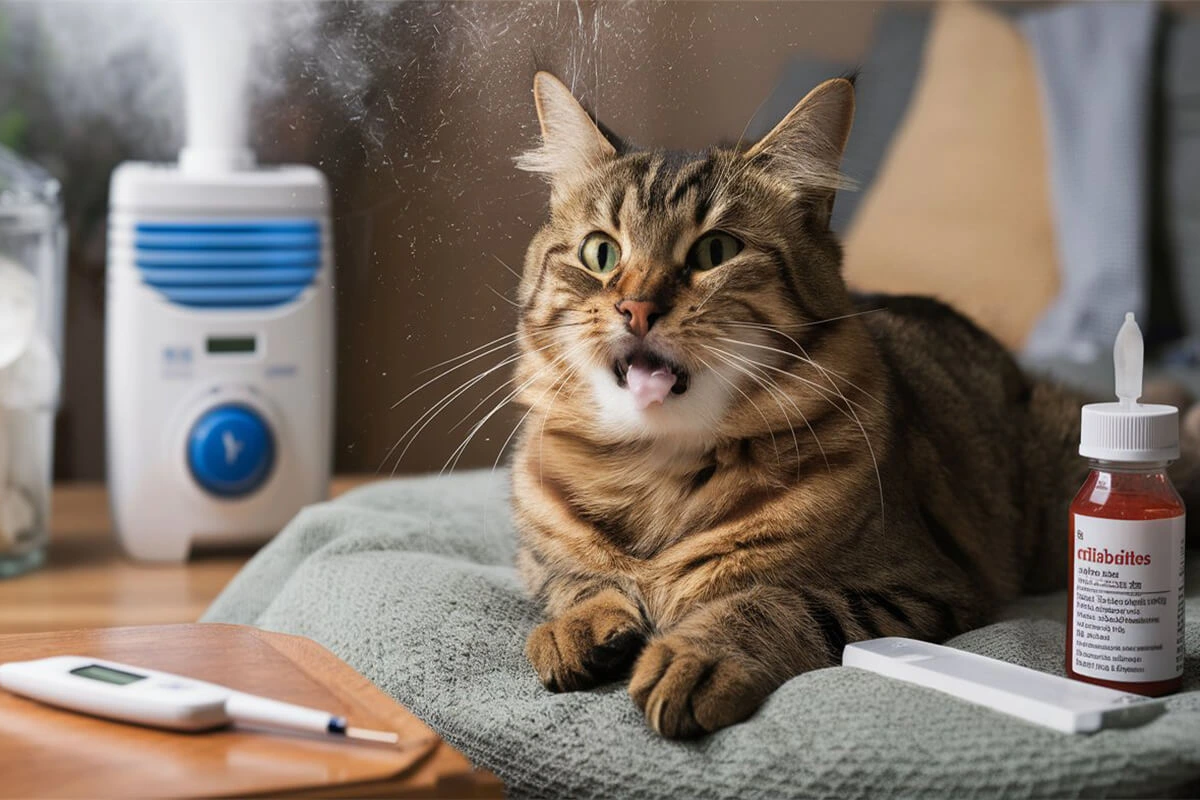
1 thought on “What’s the Top 7 Reasons Your Coughing Cat Needs Urgent Help”
Comments are closed.